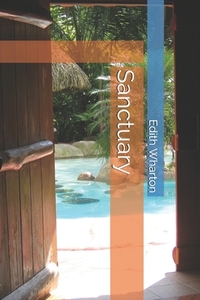You need to sign in or sign up before continuing.
Take a photo of a barcode or cover
46. Sanctuary by Edith Wharton
published: 1902
format: 52-page kindle ebook (typically ~ 100 pages)
acquired: September 7
read: Sep 27
time reading: 2:46, 3.2 mpp
rating: 4
locations: California?, New York City
about the author: 1862-1937. Born Edith Newbold Jones on West 23rd Street, New York City. Spent most of her writing life in France.
Wharton‘s 3rd work of fiction, a novella from 1902, consists of two connected parts around Kate Peyton, née Orme. First a naïve Kate discovers her fiancé has conned an inheritance, and she still marries him. In part 2 her son has a moral quandary. Kate is passionately well-meaning, morality driven and likable, but strained by circumstance, and ultimately humanly flawed. She has to discover for herself her charmed “life was honeycombed by a vast system of moral sewage.” And, she struggles herself to understand her relationship with her son, whose life she is maybe over-involved in. ("As she sat there in the radius of lamplight which, for so many evenings, had held Dick and herself in a charmed circle of tenderness, she saw that her love for her boy had come to be merely a kind of extended egotism.") She never does seem to realize how awkward is what she is doing. I think it's fair to say a lot is going here that she doesn't really understand.
I enjoyed this and reading with a Wharton group on Litsy. It gave me a lot to think about. Our next book with be [b:The House of Mirth|17728|The House of Mirth|Edith Wharton|https://i.gr-assets.com/images/S/compressed.photo.goodreads.com/books/1328729186l/17728._SY75_.jpg|1652564]
published: 1902
format: 52-page kindle ebook (typically ~ 100 pages)
acquired: September 7
read: Sep 27
time reading: 2:46, 3.2 mpp
rating: 4
locations: California?, New York City
about the author: 1862-1937. Born Edith Newbold Jones on West 23rd Street, New York City. Spent most of her writing life in France.
Wharton‘s 3rd work of fiction, a novella from 1902, consists of two connected parts around Kate Peyton, née Orme. First a naïve Kate discovers her fiancé has conned an inheritance, and she still marries him. In part 2 her son has a moral quandary. Kate is passionately well-meaning, morality driven and likable, but strained by circumstance, and ultimately humanly flawed. She has to discover for herself her charmed “life was honeycombed by a vast system of moral sewage.” And, she struggles herself to understand her relationship with her son, whose life she is maybe over-involved in. ("As she sat there in the radius of lamplight which, for so many evenings, had held Dick and herself in a charmed circle of tenderness, she saw that her love for her boy had come to be merely a kind of extended egotism.") She never does seem to realize how awkward is what she is doing. I think it's fair to say a lot is going here that she doesn't really understand.
I enjoyed this and reading with a Wharton group on Litsy. It gave me a lot to think about. Our next book with be [b:The House of Mirth|17728|The House of Mirth|Edith Wharton|https://i.gr-assets.com/images/S/compressed.photo.goodreads.com/books/1328729186l/17728._SY75_.jpg|1652564]
Edith Wharton's writing wallows in moral struggles and societal pressures, usually about adultery and social-climbing. But she tries a different approach for the novella "Sanctuary," a story that is thought-provoking and well-written, but feels more like the outline to a full-length novel than a story in its own right.
Kate Orme is wrapped up in her idyllic engagement to Denis, when a woman claiming to be his dissolute brother's wife kills herself and her child. To Kate's shock, Denis confesses that the woman was, but to avoid having a low-class person in the family, he suppressed evidence and lied. Even worse, he feels no guilt because he considers it worth the sacrifice.
Kate breaks off the engagement, but to protect any child of Denis' from his hypocrisies, she marries him. Many years later, Denis is dead, and their young son Dick is a blossoming architect about to enter a prestigious contest. But then a friend of his dies tragically, and leaves Dick his brilliant architectural plans... to enter in the contest as his own. Now Kate must see if her careful upbringing will make Dick do the right thing, or if he will follow in his father's footsteps.
Most of Wharton's books are wrapped up in ethical dilemmas or one kind or another, but "Sanctuary" tackles a very different kind of problem. And Wharton does a good job spinning out a sense of suspense, all about a young man who could tip either way, and inspiring disgust and outrage at Denis' weak, whiny defense of his crimes.
Sadly, the second half reads like Wharton was sketching out an enlarged outline for a novel, but got bored and just published it as-is. Details are sketchy, as is the society that these people live in, and more than two decades are skipped over instantly. Little of the storyline is fleshed out except for Kate's (seemingly endless) angst, which trickles on throughout way too many of the few pages.
Kate herself isn't easy to relate to -- she marries wussy Denis for a kid that might or might not be born, and spends most of the book torturing herself over Dick's future choices. She comes across as naive at best, manic at worst. Dick himself is a far more interesting character, since he exists in the grey area that most human beings inhabit -- he's a partying, slightly slackerish guy, but essentially good at heart.
"Sanctuary" tackles the grey areas and hypocrises of many "upright" people, but the second half drizzles off into a lot of bad angst and extreme reactions. Interesting, but it feels half-written.
Kate Orme is wrapped up in her idyllic engagement to Denis, when a woman claiming to be his dissolute brother's wife kills herself and her child. To Kate's shock, Denis confesses that the woman was, but to avoid having a low-class person in the family, he suppressed evidence and lied. Even worse, he feels no guilt because he considers it worth the sacrifice.
Kate breaks off the engagement, but to protect any child of Denis' from his hypocrisies, she marries him. Many years later, Denis is dead, and their young son Dick is a blossoming architect about to enter a prestigious contest. But then a friend of his dies tragically, and leaves Dick his brilliant architectural plans... to enter in the contest as his own. Now Kate must see if her careful upbringing will make Dick do the right thing, or if he will follow in his father's footsteps.
Most of Wharton's books are wrapped up in ethical dilemmas or one kind or another, but "Sanctuary" tackles a very different kind of problem. And Wharton does a good job spinning out a sense of suspense, all about a young man who could tip either way, and inspiring disgust and outrage at Denis' weak, whiny defense of his crimes.
Sadly, the second half reads like Wharton was sketching out an enlarged outline for a novel, but got bored and just published it as-is. Details are sketchy, as is the society that these people live in, and more than two decades are skipped over instantly. Little of the storyline is fleshed out except for Kate's (seemingly endless) angst, which trickles on throughout way too many of the few pages.
Kate herself isn't easy to relate to -- she marries wussy Denis for a kid that might or might not be born, and spends most of the book torturing herself over Dick's future choices. She comes across as naive at best, manic at worst. Dick himself is a far more interesting character, since he exists in the grey area that most human beings inhabit -- he's a partying, slightly slackerish guy, but essentially good at heart.
"Sanctuary" tackles the grey areas and hypocrises of many "upright" people, but the second half drizzles off into a lot of bad angst and extreme reactions. Interesting, but it feels half-written.
Es una novela de lectura rápida, es la segunda que leo de la autora y me gusto menos que la casa de la alegría aunque reconozco que para mi era una obra desconocida, como siempre la autora es muy buena con las palabras y con las situaciones parece que las estás viviendo.
Es una novela que trata numerosos temas felicidad, culpa, expiación, crecimiento personal, y como siempre las relaciones personales, hay una protagonista principal en diferentes momentos de su vida.
Me alegro de conocer más de esta autora.
Es una novela que trata numerosos temas felicidad, culpa, expiación, crecimiento personal, y como siempre las relaciones personales, hay una protagonista principal en diferentes momentos de su vida.
Me alegro de conocer más de esta autora.
challenging
reflective
slow-paced
Plot or Character Driven:
Character
Strong character development:
Yes
Loveable characters:
No
Diverse cast of characters:
No
Flaws of characters a main focus:
Yes
Para ser Edith Wharton me ha resultado flojo e insulso.
Hmm. Well, this was not The House of Mirth. The story wasn't as strong, nor the writing as fine as I am accustomed to with Wharton's best. More a little like The Reef. It was short and mostly about the relationship between a mother and a son, and IMO the mother had wayyyyy too much meddling going on in her adult son's life, to the point of spiking a girlfriend's ear with a story she hoped would influence her son to do what she wants. If you want your adult child to do what you want, you need to have the kind of relationship where you can say "I think you should do this" and then leave it. Aargh. Anyway, the mother then got way too rewarded for the meddling. This poor guy will never have a life and I think Mommie Dearest will manage to "influence away" any future spouse material. Not that I liked the girlfriend in the story much better. Argh. It was so short, I'm not sorry I read it, but it's at the bottom of my Wharton oeuvre list at the moment.

